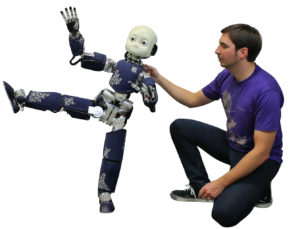
The exercise will enable the application of modern machine learning techniques and tools in robotics / cyber-physical systems. The following topics will be covered in the course:
– Kinematics, dynamics & simulation of CPS.
– Data representations & model learning.
– Control techniques, priorities & torque control.
– Planning & cognitive reasoning.
– Reinforcement learning and black-box optimization.
– Kinematics, dynamics & simulation of CPS.
– Data representations & model learning.
– Control techniques, priorities & torque control.
– Planning & cognitive reasoning.
– Reinforcement learning and black-box optimization.
The course provides a structured and well motivated overview over modern techniques and tools which enable the students to define learning problems in Cyber-Physical-Systems.
Links and Resources
- Find all relevant information in the post on the lecture 190.001 ‘Cyber-Physical-Systems’.
Optional Online Streaming:
Exercises
- Python Basics Tutorial: Jupyter Notebook.
Assignments / Team work
- Team Work 1 [submission till 16.11.22 12:00]: Jupyter Notebook on forward and inverse kinematics.
- Q&A Session on 9.11.22 12:15 in HS Themoprozesstechnik and online (live.ai-lab.science).
- Team Work 2 [submission till 21.12.22 12:00]: Assignment Description on real robot inverse kinematics.
- Q&A Session on 23.11.22 12:15 in HS Themoprozesstechnik and online (live.ai-lab.science).
- Q&A Session on 30.11.22 12:15 in HS Themoprozesstechnik and online (live.ai-lab.science).
- Q&A Session on 07.12.22 12:15 in HS Themoprozesstechnik and online (live.ai-lab.science).
- Q&A Session on 14.12.22 12:15 in HS Themoprozesstechnik and online (live.ai-lab.science).
- Team Work 3 [submission till 01.02.23 12:00]: Assignment on Dynamic Movement Primitives for real robot motion control.
Location & Time
- Location: HS Thermoprozesstechnik
- Dates: Wednesdays 12:15 – 14:00

